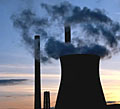
The global scientific body on climate change will report soon that only greenhouse gas emissions can explain freak weather patterns. Simultaneous changes in sea ice, glaciers, droughts, floods, ecosystems, ocean acidification and wildlife migration are taking place.
The Intergovernmental Panel on Climate Change had previously said gases such as CO2 were “probably” to blame. Its latest draft report will be sent to world governments next month.
A source told the BBC: “The measurements from the natural world on all parts of the globe have been anomalous over the past decade.
“If a few were out of kilter we wouldn’t be too worried, because the Earth changes naturally. But the fact that they are virtually all out of kilter makes us very concerned.”
He said the report would forecast that a doubling of greenhouse gas concentrations in the atmosphere would bring a temperature rise of 2-4.5C, or maybe higher.
This is an increase on projections in the last IPCC report, which suggested that the rise could be as little as 1.5C.
Uncertainties remain
The scientists will say there is still great uncertainty about the pace and scope of future change, although by the end of the century global temperatures could increase by up to 5.8C.
The doubling of CO2 from pre-industrial stable levels (270 parts per million) is expected to happen around the middle of the century.
What really worries the scientists is that we are already seeing major disruptions despite having increased CO2 by just 30%.
A recent scientific report commissioned by the UK government warned that the world might already be fixed on a path that would begin melting the Greenland ice cap. That in turn would start raising sea levels throughout the world.
There will be sceptics, predominantly in the US, who will accuse the IPCC of trying to scare policy-makers into action with their report.
And this draft will be revised several times over the coming year, so there could be major changes before the launch in 2007.
But assuming the key points remain, the broad international expert consensus embodied in the IPCC will make it harder for the US administration to say that climate change is a problem for the future which can be solved by technological advances.
In a meeting with climate campaigners, UK Prime Minister Tony Blair said the world needed to engage the Americans, Chinese and Indians in agreement over a figure for CO2 stabilisation.
But this is unlikely to happen while US President George W Bush is in office; his representative told the December climate conference in Montreal that the US would not agree any targets for reducing CO2.
President Bush’s chief adviser, James Connaughton, said recently that it was pointless discussing a safe CO2 level, as we could not be sure how resistant the world would be to greenhouse gases.
Maybe we could double CO2 with impunity, or maybe we could increase it threefold or fourfold; the issue











Social Profiles